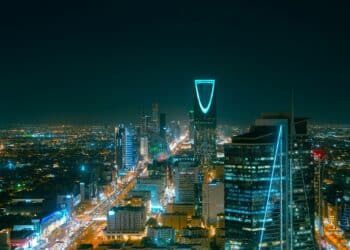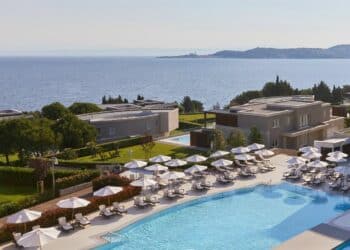As hotel investors make the most of increasingly available Islamic finance Sophia Soltani talks to industry experts to find out more about the upcoming rise in popularity of dry hotels across the region.
With Islamic finance readily flowing into the UAE, there has more recently been a steady increase in the number of dry hotels (a property that does not serve alcohol) popping up across the region, with figure conclusive data supporting the dry hotel surge, total Islamic banking assets in the UAE have rose to approximately $95 billion in 2013 compared to the $83 billion seen in 2012 from a report compiled by the Dubai Chamber of Commerce.
With the dry hotel trend reportedly beginning at the start of 2000, when Islamic finance became more readily available in the country prompting investors to build such hotels, Rupprecht Queitsch, chief executive and senior partner at INHOCO Group discusses why the trend in dry hotels is due to further flourish and grow in popularity, “the supply of dry hotels is expected to grow within the upcoming years, especially within the midscale and upper scale segment as a targeted offering to GCC guests and families. The growth in dry hotels is supported by the increased availability of Sharia compliant finance.”
Growing demand
Commenting on the stable growth potential for the dry segment within the hospitality sector, Samir Arora, general manager for dry hotel, Ramada Downtown Dubai explains, “we are strategically located within the city’s prime business and leisure district, Downtown Dubai. The hotel boasts a great view of the Burj Khalifa and the Dubai Fountain, and is a short walk away from The Dubai Mall and Souk Al Bahar. The 181-key property features spacious suites, a penthouse, an all-day dining restaurant and facilities including a well-equipped gym and outdoor swimming pool, and I see many hotel companies gravitating towards this concept. The latest one being ‘Grand Mercure Majlis.’ There is a huge halal tourism market out there too and this region will see a major expansion with this differentiation. There is a huge tourism summit in Abu Dhabi in October this year focusing on Islamic tourism. This segment is growing at the rate of 300% year on year. There are many Islamic funds that want to invest in this sector, hence why we will see an uphill climb in the dry hotel market.”

With Sharia Law and a halal friendly ethos making its presence further felt across the regions hospitality sector, Laurent A. Voivenel, CEO, HMH, Hospitality Management Holdings touches upon the factors why HMH, a large scale dry hotel chain proves to continually thrive as a market leader within its segment, “given the demand for halal-friendly hotels, being alcohol-free allows us to capitalise on the enormous opportunity that exists in this segment. Being a pioneer in creating the first and ‘still the only’ international alcohol-free chain of hotels, HMH is the region’s largest group to operate in the dry segment. Therefore, we are uniquely positioned to capitalise on the halal segment having been successful in penetrating it early. Over the years we have gathered amazing experience both in terms of operations and market intelligence in the dry hotel segment that is one of our key strengths. Unlike other companies whose aim is to have a share of the pie by creating stand-alone dry brands or hotels, all brands under HMH are halal-friendly no matter where we operate.”
“Furthermore, the Middle East is one of the fastest growing tourism and hotel markets in the world. And halal-friendly hotels will continue to claim bigger market share given the business opportunity and demand. By 2030, Muslims will make up more than a quarter of the global population rising from 1.6 billion in 2010 to 2.2 billion and 30% of this population will seek halal options.”

Family travel perks of being ‘dry’
With religious restrictions across Dubai and the UAE, only licensed hotels can indeed serve alcohol and so the dry hotel chains must find other ways in which to boost revenue and drive occupancies forward, leaving a niche in the market to be explored such as the enhancement of family travel and leisure facilities, “being a halal-friendly, family centric group, all our properties offer a safe and family-friendly environment. Our hotels offer fabulous recreation and leisure facilities as well as outstanding amenities for children such as special kids’ menus and kids clubs, this is a way to encourage travellers to choose one of our properties.
According to Thomson Reuters’ data, the value of the global family tourism market was $140 billion in 2013. The figure is set to rise to $180 billion by 2018 with growth expected to continue at a rate of 4.79% annually until 2020. Demand for inter-regional family travel will also remain robust with GCC population soaring to 53.5 million by 2020. We are eager to grow our footprint in this significant sector and are keen to have a bigger share of market as well as raise awareness among hotel developers / owners about the opportunity and our strengths in the segment.” Explains Voivenel.
Also adding to the family travel benefits of being dry, Wael El Behi, general manager, Hawthorn Suites by Wyndham elaborates, “we are well equipped to cater for the family travel market with our large rooms and suites overlooking the sea and the Marina. We have an excellent outdoor pool deck overlooking the Bluewater Island, a nice and relaxing garden area, and direct access for our guests to the Walk and the JBR community, state of the art spa and beauty salon. Hawthorn Suites by Wyndham provides all these facilities and conveniences at a great value for money.
Our top 5 source markets to date holds no direct impact on our business from being a dry hotel, KSA is our number one feeder market followed by the UK, Russia, Germany and Turkey. We will continue sourcing for potential and new emerging markets, highlighting our prime location, product and accessibility. Our guests can go next door if they want to drink alcohol where plenty of options are available for them, but often family focused holidays have no mind to worry about alcohol, as long as our facilities cater to their other needs we will stay in business”
According to Julie Olsson Blou, senior project manager, INHOCO, “some hotels promote a dry offering, for example TAJ Palace, Dubai and Jawhara hotels promote themselves as an Islamic hotel, and these dry hotels often attract travellers with Islamic beliefs, families and single women who want calm and family friendly accommodation.”
The challenges
According to an INHOCO analysis, 65% of hotels in Dubai do not serve alcohol, with a total of 204 dry hotels in the region, but despite there being such a high number of alcohol free hotels and a number of incentivised reasons including funding and government support to launch into such new projects, as with every venture stands the challenges, and many beverage driven hotels do not face the trials and tribulations that dry hotels indeed must overcome, El Behi discusses strategic mechanisms to overcoming these hurdles, “It undoubtedly has an impact on the F&B revenue and profitability especially for certain types of cuisine and food concepts where alcohol is pretty much required. Hence, we strategically decided to limit our F&B operations with an all-day dining restaurant serving buffet for the 3 meals mainly for our in-house guests, and one specialty restaurant (Asian fusion cuisine) where alcohol is not a must and with this business approach, we definitely have better control on the cost.
We are strategically focusing more on the room occupancy, revenue and profitability rather than F&B because this is where all hotels make the maximum profit margins. Hotels generally does 75 to 85% profit from the room sell against 30 to 35% profit from the F&B sell. So far our top and bottom line performance is positive including the F&B where we are showing that this department can be profitable without alcohol if it is managed and the target is set properly.”
Voivenel adds, “It all depends on the facilities at the hotel. A dry hotel can yield the same GOP as the one with alcohol, provided the facilities are defined right. After food and beverage, the largest moneymaker in a hotel is banqueting. So whenever HMH is involved in planning and development of hotel, we advise owners to allocate maximum space to meeting and banquet facilities instead of too many food and beverage outlets as that could generate superb revenue.”
Touching upon the GCC travel market and preferred outlets, Arora explains “we see this more as an opportunity especially with our GCC clients. We are their first preferred hotel in Downtown area. During the peak season, our hotel fills first in the area. We do often get a challenge with some corporate companies but overall it gets compensated with many options in Downtown. All of them are within walking distance. Our location and product compensate for the absence of alcohol. We have not received a single written complaint about this aspect, so we see this as an advantage.”
The pros
“Contrary to popular belief, a dry hotel can be as lively and vibrant as any hotel. One of the greatest plus of a dry hotel is a safe and healthy environment that is perfect for families as well as single women travellers. These hotels tend to focus on clean fun and entertainment. Creativity and passion ensure guests an exceptional experience,” explains Voivenel in full praise of the dry segment.
With the general consensus molding around the fact that dry hotels provide an accelerated safe and friendly environment El Behi adds, “these kinds of hotels are more family-friendly which means safer environment and more privacy for family holidays, short vacations or weekend breaks. In addition, these types of hotels generate better profit margin if they are managed properly and set realistic budgets, dry hotels are increasing their presence in the market place gradually but surely. They are trying to diversify their products and focus on locations. Our upcoming property in 2016 will be a 4-star deluxe family and lifestyle resort on Palm Jumeirah, which will also not serve alcohol, call it brave if you like.”


































































